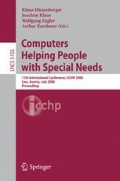Abstract
A spectrum of human abilities, which people use to communicate and socially interact with others, is narrow enough (Table 1). Moreover, even basic human abilities (sensory-motor or/and cognitive) can be lost due to an accident or an illness. Nevertheless, the key issue is not how many different tools are needed to solve a specific problem but whether a person desires to be socially included [1, 2, 4, 7, 12, 14]. Social inclusion aims to reduce inequality between the least advantaged groups and communities and the rest of society. Nevertheless, the inclusion cannot be achieved when a target group or an individual person has a lack of skills to meet social challenges and opportunities.
Access this chapter
Tax calculation will be finalised at checkout
Purchases are for personal use only
Preview
Unable to display preview. Download preview PDF.
References
Alison Lapper. Wikipedia article, http://en.wikipedia.org/wiki/Alison_Lapper
AMFPA - Association of Mouth and Foot Painting Artists of the World, http://www.amfpa.com/
Armstrong, K., Waycott, J., Langan-Fox, J.: Skill Acquisition: Measurement, Theory & Research. In: Productivity, Ergonomics & Safety. 33rd Annual Conference of the Australian Ergonomics Society, Brisbane, Canberra, pp. 67–73 (1997)
Coalition for Disabled Musicians Inc., http://www.disabled-musicians.org/
Communication by gaze interaction. Project site, http://www.cogain.org/
Conway, C.M., Christiansen, M.H.: Sequential learning through touch, vision, and audition. In: The 24th Annual Conference of the Cognitive Science Society, pp. 220–225. Lawrence Erlbaum Associates, Mahwah (2002)
DisabilityTraining.com, http://disabilitytraining.com/
Evreinova, T.V., Evreinov, G., Raisamo, R.: Non-visual game design and training in gameplay skill acquisition - a puzzle game case study. Interacting with Computers 20(3), 386–405 (2008)
Kapur, N., Glisky, E.L., Wilson, B.A.: Technological memory aids for people with memory deficits. Neuropsychological Rehabilitation 14(1/2), 41–60 (2004)
Kirsh, D.: Complementary strategies: Why we use our hands when we think. In: Moore, J.D., Lehman, J.F. (eds.) The 17th Annual Conference of the Cognitive Science Society, pp. 212–217 (1995)
Literacy. Wikipedia article, http://en.wikipedia.org/wiki/Literacy
Pavlacka, K.: Disabled Doesn’t Mean Unskilled (2007), http://www.cwd-o.org/cwdo/activities/employment_committee.php?activities-employment=205
Shorrock, T.H., MacKay, D.J.C., Ball, C.J.: Efficient communication by breathing. In: Winkler, J.R., Niranjan, M., Lawrence, N.D. (eds.) Deterministic and Statistical Methods in Machine Learning. LNCS (LNAI), vol. 3635, pp. 88–97. Springer, Berlin/Heidelberg (2005)
Visually Impaired Musicians Association VIMA, http://www.uk-piano.org/vima/
Author information
Authors and Affiliations
Editor information
Rights and permissions
Copyright information
© 2008 Springer-Verlag Berlin Heidelberg
About this paper
Cite this paper
Evreinov, G. (2008). Skills vs. Abilities. In: Miesenberger, K., Klaus, J., Zagler, W., Karshmer, A. (eds) Computers Helping People with Special Needs. ICCHP 2008. Lecture Notes in Computer Science, vol 5105. Springer, Berlin, Heidelberg. https://doi.org/10.1007/978-3-540-70540-6_173
Download citation
DOI: https://doi.org/10.1007/978-3-540-70540-6_173
Publisher Name: Springer, Berlin, Heidelberg
Print ISBN: 978-3-540-70539-0
Online ISBN: 978-3-540-70540-6
eBook Packages: Computer ScienceComputer Science (R0)

